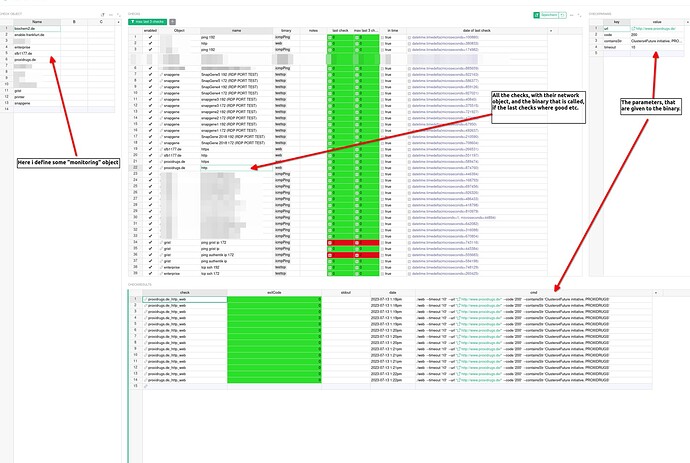I had a strange idea, why not use grist as an infrastructure monitoring tool?
For an old (inhouse, defunct) monitoring system, i had written some binaries that could do some specific jobs, like query a webpage, ping a system, connect to a tcp port, etc.
All those binaries had in common, that on sucess, they return 0, on error they return 2 and on warning they return 1. Also they would write error messages to the stdout.
For example, to test an tcp port:
./testtcp --url '192.168.0.218' --port '3389'
Or test if a specific string is on a webpage:
./web --containsStr 'Characterization of Selective Autophagy' --url 'https://www.sfb1177.de/' --timeout '10' --code '200'
Now, i’ve written a short “daemon” that connects to grist via its api, get all specific checks + their settings,
call the binaries, send the results back to grist, and voila an actually nice system:
I don’t know yet if i want to explore this idea further but so far it actually works quite good.
Edit: The good thing about those small binaries is, you could easily write them, or wrap an existing binary in a shell script, to return those error codes and just call those via the “daemon”, so its easily extendable.
What do you think?
Edit2:
Also the daemon is only 40 lines of Nim code.
import gristapi, json, os, strutils, tables, times
import strformat, osproc, threadpool
var grist = newGristApi(
docId = "<myDocId>",
apiKey = "<myApiKey>",
server = "<myGristServer>"
)
proc doCheck(name, binary, params: string) {.thread.} =
{.gcsafe.}:
let cmd = fmt"./{binary} {params}"
let (output, exitCode) = execCmdEx(command = cmd)
case exitCode
of 0:
echo fmt"[GOOD] {name}"
else:
echo fmt"[BAD!] {name}"
discard grist.addRecords("Checkresults", @[%* {
"check": name,
"exitCode": exitCode,
"stdout": output,
"date": $now(),
"cmd": cmd
}])
let checks = grist.fetchTableAsTable("Checks", filter = %* {"enabled": [true]})
for id, check in checks.pairs:
let name = check["slug"].getStr()
let checkparams = grist.fetchTableAsTable("Checkparams", filter = %* {"check": [id]})
let binary = check["binary"].getStr()
var params = ""
for checkparam in checkparams.values:
let key = checkparam["key"].getStr()
let value = checkparam["value"].getStr()
params &= fmt" --{key} '{value}' "
spawn doCheck(name, binary, params)
sync()
